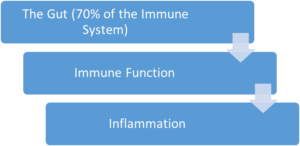All Disease Begins in the Gut.
Hippocrates said this more than 2,000 years ago, and now we are finally beginning to realize how right he was. More and more research continues to show how our gut function is implicated in all aspects of health. Many people suffer from some form of digestive complaint. It could be as serious as Ulcerative Colitis or Chron’s or it could be more mild symptoms such as heartburn, bloating, constipation, or diarrhea. However, many people have impaired gut function but it presents itself as other conditions. Gut health has been implicated in every disease condition from diabetes, heart disease, arthritis, autism, depression, chronic fatigue, and chronic pain. In fact, when someone presents with acute low back pain, I assume it is a gut issue until proven otherwise.
In this article I will explore how our digestive system effects other organ systems throughout our body from our immune system to our brain and hormone balance.
Immune Health, Inflammation, and the Gut – A Trinity of Health
If you have ever seen any of my articles, inflammation is always mentioned because it is the driver of so many other health issues. If patient’s had good control over their inflammatory responses then most chronic diseases would be irrelevant. That said, it is the immune system that controls inflammation therefore when we are discussing inflammation, it is more correct to refer to that as immune imbalance or dysfunction.

Our immune system is made up of our thymus, spleen, bone marrow, lymph tissue, in addition to our brain and hormone systems. But it is the gut that accounts for up to 70% of our immune activity through the GALT-gut associated lymphoid tissue.
When you think of your gut, you often do not realize that it is actually the outside of your body. It really is a hollow tube that runs from your mouth to your anus. From an immune perspective this is incredibly important, because one of its main jobs is to allow for the absorption of nutrients, all the while not letting in foreign invaders to the body. The gut acts like a bouncer at a night club, making sure they don’t let in any trouble makers.
The immune system is designed to recognize one’s self and remove substances that are not. During autoimmune disease, the immune system has tag the body’s own tissues for destruction and the immune starts to attack your own tissues. One of the main drivers of autoimmunity is leaky gut syndrome.
In leaky gut syndrome, the bouncers in the gut are not doing a very good job and they are allowing substances such as partially digested food, toxins, and possible microbes into the night club. This will initiate an immune response and inflammation will ensue. Therefore, you don’t have to have gut symptoms in order to have leaky gut syndrome, it may manifest as any chronic inflammatory condition such as eczema, psoriasis, Hashimoto’s, arthritis, depression, or more.
Leaky gut syndrome causes food sensitivities, however, I feel it is dysbiosis that causes leaky gut syndrome. In order to improve the health of the patient both dysbiosis and food sensitivities need to be addressed. Dysbiosis is the number one cause of inflammation in health conscious individuals (patients who do all the right things (strict diet, plenty of rest, exercise but don’t overdo it). Dysbiosis is a condition with microbial imbalances on or inside the body. Simply put we have things growing in or on us that shouldn’t be there. Addressing dysbiosis, is my biggest concern as a provider, because it can be a huge stressor to the patient and unfortunately it is something that is difficult to address on your own.
The Gut-Brain Axis
We have all heard the term, I feel it in my gut or I had a gut feeling. These expressions did not come about for no reason and the health of our gut can have a tremendous impact on the health of our brain, particularly our emotional health. At the same time, our brain can have a tremendous impact on our gut function. We have all felt how we may lose our appetite if we received some bad news or how we may have to rush to the bathroom if we get nervous, these are examples of how our brain is effecting our digestion.
Common causes of brain dysfunction are:
- Inflammation
- Toxic Overload
- Neurotransmitter Imbalances
We just discussed how our gut will drive systemic inflammation throughout our body. In addition, for anyone suffering from a long term brain health condition, it is recommended to try a gluten free diet. Dr. Datis Kharrazian, author of Why Isn’t My Brain Working, talks extensively on the detrimental impact that gluten can have on the brain.
Ideally, our brain would be a toxin free and sterile environment. Our body is equipped with a blood brain barrier that has a function similar to the gut lining, namely let good stuff in and keep bad stuff out. However, like the gut barrier and the brain barrier can get leaky, in fact, people with leaky guts will also have a tendency towards leaky brains.
A key aspect of anyone dealing with a mood disorder, whether it is anxiety, depression, or lack of motivation is to understand that many of the neurotransmitters required to regulate these emotions are manufactured in the gut; most notably serotonin and dopamine. Approximately, 90% of your serotonin is made in the gut so before you go on that prescription for an anti-depressant understand that addressing your gut health is crucial.
Gut Function and Hormone Balance
Hormone issues are very common and they often begin with issues of cortisol and insulin. Cortisol and insulin problems are often driven by stress and blood sugar imbalance. Therefore, if you eat a lot of carbohydrates and are stressed out all the time it is easy to have issues with these two hormones.
However, one of the main reasons why someone has strong sugar cravings can be due to a bad gut flora. Excessive carbohydrate intake (esp. refined) creates an environment that promotes the development of fungi and bad gut bacteria. These organisms then have the ability to effect food cravings, driving you to eat more refined carbs to promote their existence. It can become a vicious cycle that leads to hormone problems and diabetes.
In addition, a bad gut flora has been shown to inhibit estrogen detoxification. Many female hormone problems are driven from estrogen dominance, where the estrogen to progesterone ratio is too high. If estrogen detox is impaired then estrogen dominance is possible.
Conclusion
This is a short summary of how our gut health impacts the health of other organ systems. If gut function is optimal many patients would no longer be stuck in chronic disease states. One of my main treatment focuses is to find reasons why your digestion may be impaired or how other organ functions may be affected by your gut function. For more information, please feel free to contact my office and read this article on improving your digestion.

